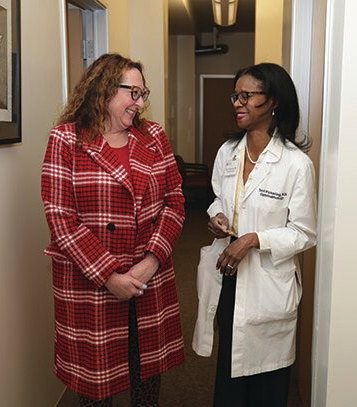FOR YOUR HEALTH: Menopause and Dry Eye: What Women Need to Know
 It would be wise for women with dry eyes to see their ophthalmologist.
It would be wise for women with dry eyes to see their ophthalmologist.
(NAPSI)—It may seem surprising to some but dry eye is one of the most common conditions women going through the menopause experience.
“Dry eye is a complicated eye condition with various causes. It affects men and women of all ages, but women entering menopause are more likely to experience dry eye because of hormonal changes affecting the eye,” said Purnima Patel, MD, an ophthalmologist and volunteer for EyeCare America®, a program offering no-cost eye exams to uninsured or underinsured Americans.
Dry eye disease is a common condition that happens when your tears don’t adequately lubricate your eyes. When you blink, tears spread over the surface of the eye. This keeps the eye smooth, clear and comfortable. Dry eye can happen when you don’t produce enough tears, when you produce poor-quality tears, or your tears dry out too quickly. It can lead to red, irritated, tired or painful eyes.
Why Is Dry Eye More Common During Menopause?
During menopause, the body produces less of the hormones estrogen and progesterone. Hormonal changes during menopause are likely linked to dry eye disease, but the exact mechanism is not known, and more research is needed. In general, dry eye can result from lower tear production and reduced lubrication from the eye’s oil glands. This can cause a scratchy feeling or light sensitivity, making it hard to read or drive at night. It can also cause blurry vision.
What Should You Do if You Have Dry Eye?
Artificial tears, also known as lubricating eye drops, are the most common treatment for dry eye. Most are available without a prescription. It’s important to note that drops with preservatives can irritate your eyes if you use them too much. If you need artificial tears more than a few times a day, use drops without preservatives. These come in single-serving droppers. Warm compresses on the eyelids are another at-home treatment.
For some people, a few simple lifestyle changes can resolve dry eye. If you live in a dry place, consider using a humidifier. Direct fans away from your eyes. Take regular breaks from computers and smart phones. Protect your eyes from the wind by wearing wrap-around glasses outside. If you wake up with dry and scratchy eyes, use thicker eye drops such as an artificial tear ointment or gel just before you go to bed.
When Should You See a Doctor About Dry Eye?
If your dry eye is severe, visit an ophthalmologist to help determine the cause and the best treatment options for you. Based on your examination, your ophthalmologist may recommend a prescription eye drop or ointment, tiny plugs inserted into the eyelids to help keep tears in the eye longer, or other medications.
Ophthalmologists are physicians who specialize in medical and surgical eye care. During an eye exam, an ophthalmologist will look at your eyelids and the surface of the eye and determine the amount and quality of your tears.
“Not sure why you’re experiencing dry eye? Maybe you’ve tried over-the-counter drops, but your eyes are still bothering you? It’s best to see a doctor to figure out the cause of dry eye,” Dr. Patel said. “If you already use eye drops for dry eye and have been using the drops more than three times a day, that may be a sign to check in with your ophthalmologist about an additional treatment option that may work better for you.”
Can’t Afford an Eye Exam? EyeCare America® Can Help
Individuals who are uninsured or underinsured may be eligible for a no out-of-pocket cost medical eye exam through the American Academy of Ophthalmology’s EyeCare America® program. This public service program matches volunteer ophthalmologists with eligible patients in need of eye care across the United States. To see if you or a loved one qualifies, visit www.aao.org/eyecare-america/patients.
Responsible journalism is hard work!
It is also expensive!
If you enjoy reading The Town Line and the good news we bring you each week, would you consider a donation to help us continue the work we’re doing?
The Town Line is a 501(c)(3) nonprofit private foundation, and all donations are tax deductible under the Internal Revenue Service code.
To help, please visit our online donation page or mail a check payable to The Town Line, PO Box 89, South China, ME 04358. Your contribution is appreciated!


Leave a Reply
Want to join the discussion?Feel free to contribute!